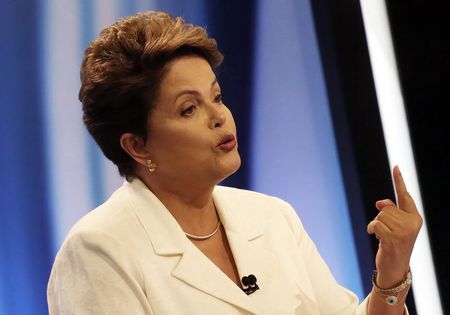By Alonso Soto
BRASILIA (Reuters) - Whoever President Dilma Rousseff picks to head Brazil's finance ministry if she is re-elected on Sunday will likely get a cold welcome from investors, who are sceptical that the leftist leader will stop dictating policy herself.
Guido Mantega, Brazil's longest-serving finance minister, plans to step down at the end of December after more than eight years on the job. His replacement faces the daunting task of breathing life into an economy grappling with slow growth, rising consumer prices and deteriorating public finances.
Rousseff is considering a politically connected businessman to replace Mantega, according to several government officials and private-sector sources familiar with the president's thinking. They say that a former deputy finance minister as well as her chief of staff are also on Rousseff's short list.
Locked in a tight election race against centrist rival Aecio Neves, Rousseff has come under pressure to signal that she would embrace market-friendly policies if she is elected to a second term. In a nod to investors, the president has said she would make changes at the finance ministry, but has not provided specifics.
Though many in Brazil's business community welcome Mantega's departure, some question whether Rousseff's probable candidates to replace him at the helm of Latin America's largest economy would steer a markedly different course.
"The market will remain very sceptical regardless of who she appoints," said Gustavo Rangel, chief economist for Latin America at ING in New York. "Even if she puts someone there who has a good reputation, at the end the day success will depend on how much autonomy she gives that person."
One name circulating in government and business circles is Josue Gomes, a Vanderbilt University graduate who is chief executive of textile giant Coteminas.
Gomes is part of a small group of business leaders who are close to Rousseff. His late father, Jose Alencar, served as vice president under Rousseff's predecessor and mentor, Luiz Inacio Lula da Silva.
"Josue is a good candidate for the ministry," said a minister in Rousseff's administration who declined to be named. "She needs someone from the private sector to rebuild bridges with the market."
Gomes declined an invitation to be trade minister earlier this year. But officials said he is inclined to take the finance ministry job after losing a bid for a Senate seat this month.
Another name under consideration, officials say, is Nelson Barbosa, a former deputy finance minister. Barbosa left the administration in 2013 over disagreements with some peers at the ministry, but he remains in good standing with Rousseff and Lula, officials said.
A latecomer to the finance ministry race is Rousseff's chief of staff, Aloizio Mercadante, who is also the frontman on economic issues in her re-election campaign. Like Rousseff, he studied at the University of Campinas, a bastion of leftist economics, and is considered an effective manager.
Gomes, Barbosa and Mercadante did not respond to requests for comment.
THE REAL MINISTER
None of those options generate much enthusiasm in the market, mainly because investors doubt they would lead to a significant shift in economic policy. Barbosa and Mercadante share Rousseff's belief that the state should drive economic growth, not private enterprise alone.
"It will take actions, policy changes, for Rousseff to start reconciling with the market and I don't believe any appointment will make a difference," said Ilan Solot, senior emerging market strategist at Brown Brothers Harriman in London.
"Unless she brings someone completely off the radar screen, which is very unlikely."
Neves has already announced his choice for the finance ministry, part of a campaign strategy aimed at persuading voters that he is best equipped to revive the economy.
His pick is Arminio Fraga, a prominent hedge fund manager and former central bank president who is well respected on Wall Street.
Whoever takes the reins next will face a list of challenges that includes high inflation, a slowdown in consumer spending, slumping business confidence, and a weaker-than-expected global recovery.
But if Rousseff wins, a bigger challenge for the next finance chief might be working with a president who aides say likes to micromanage economic policy.

A self-declared policy wonk who studied economics, Rousseff was directly involved in overseeing multibillion-dollar stimulus packages and devising measures that sought to reduce electricity costs by strong-arming utilities to lower rates.
(Editing by Todd Benson; and Peter Galloway)
